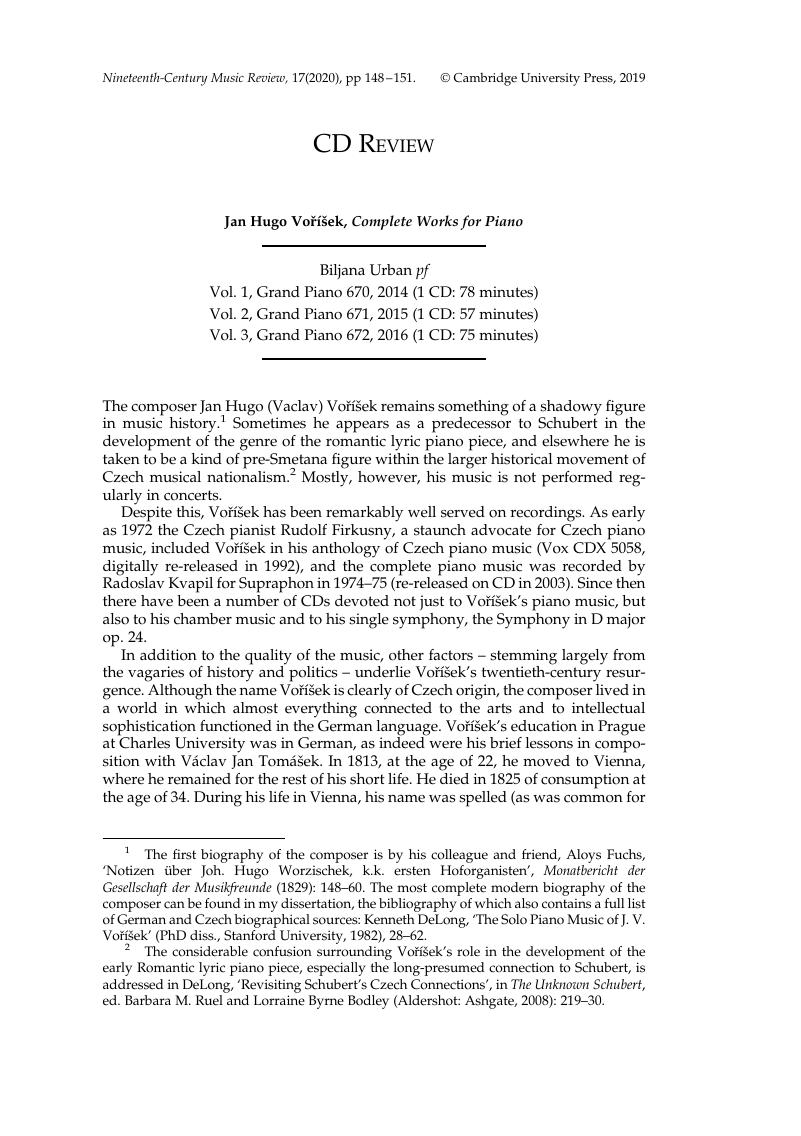No CrossRef data available.
Published online by Cambridge University Press: 19 February 2019

1 The first biography of the composer is by his colleague and friend, Aloys Fuchs, ‘Notizen über Joh. Hugo Worzischek, k.k. ersten Hoforganisten’, Monatbericht der Gesellschaft der Musikfreunde (1829): 148–60. The most complete modern biography of the composer can be found in my dissertation, the bibliography of which also contains a full list of German and Czech biographical sources: Kenneth DeLong, ‘The Solo Piano Music of J. V. Voříšek’ (PhD diss., Stanford University, 1982), 28–62.
2 The considerable confusion surrounding Voříšek’s role in the development of the early Romantic lyric piano piece, especially the long-presumed connection to Schubert, is addressed in DeLong, ‘Revisiting Schubert’s Czech Connections’, in The Unknown Schubert, ed. Barbara M. Ruel and Lorraine Byrne Bodley (Aldershot: Ashgate, 2008): 219–30.
3 Jan Václav Voříšek, Impromptus, Op. 7, ed. Vladimír Helfert (Prague: Editio Supraphon, 1964; reprint, 1976). As Vladimír Helfert writes in the forward, ‘Jan Voříšek is of important significance also for the tradition of Czech music before the time of B. Smetana. He was one of Smetana’s most outstanding predecessors. Indeed, in his music many figures appear which, later on, Smetana took as a starting point in his compositions’ (p. viii). At the time Smetana began to compose his piano music, Voříšek’s piano music had long been out of print and had been almost entirely forgotten. That Smetana could have encountered a single work by Voříšek is only a remote possibility. The logic for a connection between the two composers thus lies in whether one believes in the notion of a unique Czech ethos (or ‘intonation’ as it is sometimes called) possessed by both composers that would link the two. Despite its appeal, the notion is, in this instance at least, a point of fantasy.
4 There are other single CDs of Voříšek’s music, and most include the impromptus, sonata, and fantasy. Among the more important: Randall Love, Fortepiano Music of Jan Voříšek (Titanic-Ti-234, 1997); Chris Seed, Voříšek, Impromptus, Op. 7, and Tomášek, Eclogues, Op. 66 (Olympia-OCD 689, 2000), on fortepiano; Olga Tverskaya, Jan Václav Voříšek: Works for Piano (Opus 111, 2001), on fortepiano; Gerlint Böttcher, Voříšek, Rhapsodies, and Schubert, Impromptus (Ars Musici 232905, 2007); and David Gross, Jan Václav Voříšek, (Centaur-CRC 3022, YEAR).
5 For a historical and analytical discussion of the Fantasie in C major op. 12, see DeLong, ‘Voříšek and the Fantasy’, in Janáček and Czech Music: Proceedings of the International Conference (St. Louis 1988), ed. Michael Beckerman and Glen Bauer (New York: Pendragon Press, 1988): 191–214.
6 On this point, see DeLong, ‘The Solo Piano Music of J. V. Voříšek’, 141–2.
7 On the Rhapsodies op. 1, see DeLong, ‘The Piano Rhapsodies in J. V. Voříšek’, Journal of the American Liszt Society 26 (1989): 12–28, reprinted in Czech Music 25 (2007/2008): 41–61.